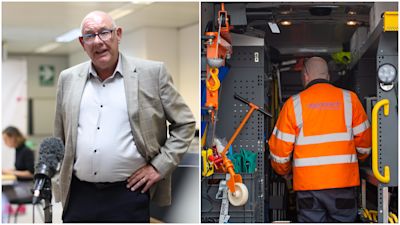Exclusive
Union boss refuses to rule out disruption to 999 calls as BT workers back strike action

ITV News Business and Economics Editor Joel Hills outlines the context around BT workers voting overwhelmingly in favour of strikes in a dispute over pay
Staff at BT Group have voted overwhelmingly in favour of strike action for the first time since 1987. The company has been in dispute with the Communication Workers Union (CWU) ever since it made a pay award of £1,500 to all of its 60,000 staff in April. BT says it was the most generous pay rise for 20 years, equating to between 3% and 8% depending on base salary.
The union says the increase doesn’t keep up with inflation and points out that salaries across the group were frozen last year.
The CWU balloted 40,000 workers, including broadband engineers, retail and call centre staff. 94% of those who voted backed strike action. “We believe this is the first time in UK history that call centre workers across multiple sites have voters in favour of industrial action,” said Dave Ward, head of the CWU.
Around 200 of the union’s members handle 999 calls. I asked Dave Ward if he could promise that strike action would not affect emergency calls.
“We can’t promise that at the moment,” he told ITV News.
“But BT can avoid all of that if they come to the negotiating table with a better offer and enter meaningful negotiations.”
Dave Ward said he can't promise if 999 calls will be affected by the industrial action
Workers at BT, Openreach and EE were balloted separately. Turnout across the three ballots averaged 61% but staff at EE, the smallest group, were eight votes short of the 50% threshold required for a ballot to be lawful. The CWU says BT has until the end of next week to improve its offer or it will announce strike dates. The union has to give the company at least 14 days notice of proposed action. BT’s chief executive, Philip Jansen, received a 32% pay increase to £3.5 million in the last year, due to bonuses and share awards. His basic salary was frozen at £1.1 million. A spokesperson for BT said: “Our job is to balance the competing demands of BT Group’s stakeholders and that requires careful management, especially in a challenging economic environment.
"The result of the CWU’s ballot is a disappointment but we will work to keep our customers and the country connected.”
They later added: “We’ll be talking to the CWU and as part of that we’ll address what continuity plans we can put in place to protect life and limb services.” A source at the company added that senior staff will be trained in its 999 service if needed.
Want a quick and expert briefing on the biggest news stories? Listen to our latest podcasts to find out What You Need To Know